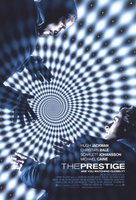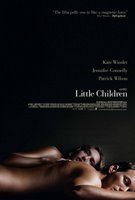 The second of 2006's fin de siècle magician thrillers is also the better of the two. That said, it's not really fair to compare Christopher Nolan's The Prestige to The Illusionist; the two films are playing entirely different games. In this case, we have a wholly effective thriller with very little at its core; but it's hard to complain about a film this self-assured and stylish.
The second of 2006's fin de siècle magician thrillers is also the better of the two. That said, it's not really fair to compare Christopher Nolan's The Prestige to The Illusionist; the two films are playing entirely different games. In this case, we have a wholly effective thriller with very little at its core; but it's hard to complain about a film this self-assured and stylish.Hugh Jackman and Christian Bale play Robert Angier and Alfred Borden, two rival magicians in the early years of Edwardian London. Giving away the plot would be a sin; let it only be said that both men are trying to create the world's greatest illusion, not for love of the craft but in order to one-up each other. Michael Caine and Scarlett Johansson are on hand to aid in this war, although how they do so is best left a surprise.
In all honesty, it doesn't take much to figure out where the plot is going to twist and turn long before it gets there. But I can't persuade myself that it matters. This is not a film like The Illusionist, where the film's audience is equal to the magician's audience. For all that its plot follows the structure of a magic trick (neatly laid out for us in the opening moments of the film), The Prestige possesses a stage-eye view of the proceedings, and we are meant not to be dazzled by the trickery but complicit in the sordid ways in which it is effected.
The script is a treasure: like Nolan's Memento, it's a twisty mess of flashbacks nested within each other, hopping from era to era with little fanfare. This is not, I think, meant to confuse us (sleight-of-hand), but simply to mimic the confusion and fragmentation that the revenge-addled protagonists suffer from throughout the proceedings. Moreover, given that the primary conflict is driven by an event in the long-distant past, it makes sense that the past would keep insisting on poking its way into the constantly-shifting present. Unlike most mindfuck films, where twistiness is its own justification, this brilliantly-structured story earns every flashback.
Which is not to say it lives and dies by its script; Christopher Nolan is a brilliant director of images, and his work with longtime collaborator Wally Pfister is possibly their best yet. I adored the nihilistic blacks of Batman Begins, but even I have to admit that everything about The Prestige looks better. It's a world on the cusp of indoor electrical lights, and the camera lovingly captures every detail of the dusky light that entails. I can't in good faith call any of it very imaginative, but that doesn't mean it hasn't been done well. It's by turns gloomy, mysterious and occasionally cheerful, and that sort of tonal shifting must be saluted.
The cast is uniformly fine, although Johansson doesn't get much to do; the absolute standout, however, is David Bowie in an extended cameo as Nikola Tesla. The role doesn't make sense, but it's flashy and impossible to resist, and in this way it is a perfect match for the former Ziggy Stardust. And for the film as a whole: gorgeous, unsubtle, and extraordinarily talented.
9/10
 Little Children was the second film I saw in two days that could have been absolutely perfect if only the script had been better. In this case, it's a brilliant character study and satire of suburban paranoia, marred by constant, overly literal narration and a too-neat ending that puts a lovely lace bow on a film about human sloppiness.
Little Children was the second film I saw in two days that could have been absolutely perfect if only the script had been better. In this case, it's a brilliant character study and satire of suburban paranoia, marred by constant, overly literal narration and a too-neat ending that puts a lovely lace bow on a film about human sloppiness.When it works, however, it's impossible to deny it: it reads much like an infinitely-smarter American Beauty, and even an improvement over director Todd Field's exceptional In the Bedroom. For the most part, it's a comedy of manners, following the sterile lives of Sarah (Kate Winslet) and Brad (Patrick Wilson), two at-home parents in an upper-middle-class community who escape from their stifling marriages and annoying children in a torrid, but well-secreted love affair. While this is going on, their neighborhood erupts at the arrival of a convicted sex offender (Jackie Earle Haley, onetime child star, in the sort of comeback performance that restores your faith in the art of acting).
It's not just that the script, by Field and Tom Perrotta from Perrotta's novel, is one of the best eviscerations of suburban culture in recent memory. Traditionally, Hollywood like to imagine that all of those neat yards and nice homes hide festering, boiling sin, but Little Children is smarter than that - it recognises that the true demon of the middle class is banality, and unending boredom, and that festering sin would be a step up. Sarah and Brad certainly understand that, even if they can't put it in those words.
No, what makes pushes this from good to so! damn! good! is that it might just be the most visually savvy American film of 2006. Field and his cinematographer Antonio Calvache use a scheme of endless close-ups throughout, not as so many contemporary filmmakers do because they learned everything from television, but because of the pushy way it invades the personal space of the characters, in all their mistakes and glories. And it's intimate and humanising as well; never have I seen so much beautifully flawed skin in an American film.
But that narration! It's the sign of weak writing, universally acknowledged, and the film doesn't deserve that. As it stands, is the narration necessary? Yes. And there's even a tortured path by which it works (playing off of an early comment about anthropology, we are tacitly invited to view this as a documentary of dull animals in their natural habitat). I just wish I didn't have to make it work.
As to the ending: not "happy," really, but very determined. If there's one thing that Little Children gets right, it's that were at our best when we can be glorious messes; why then does it make sense to tie everything up and sweep away all of the ragged edges?
9/10
I offer a very belated "Welcome back Tim!" though I must say, who expected a post on a Sunday? Feeling better now?
ReplyDelete